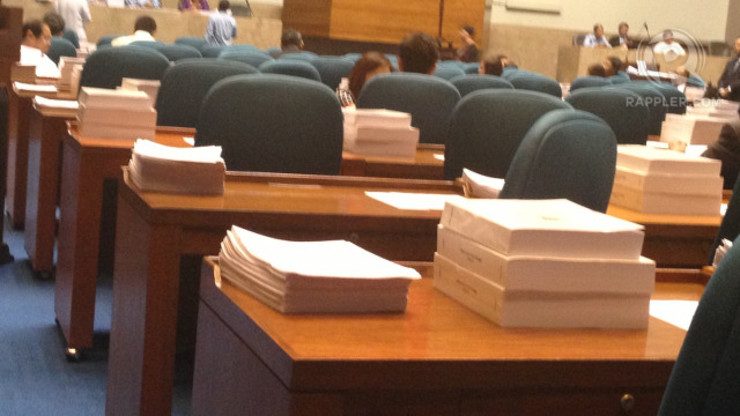SUMMARY
This is AI generated summarization, which may have errors. For context, always refer to the full article.

MANILA, Philippines – The chairman of the Senate’s ways and means committee is urging the executive and the legislature to observe transparency not just in the preparation of the proposed budget but also in deliberating and executing it.
Senator Juan Edgardo Angara said in a statement on Friday, August 22, that “the open budget initiative should transcend all” stages of the budget process, as the public has become wary after controversies hounded the lawmakers’ pork barrel scam and Malacañang’s Disbursement Acceleration Program (DAP).
The two chambers of Congress are deliberating the proposed P2.606 trillion nation budget for 2015.
“We cannot have a system in which the budget bill is debated in the open, in plenary, only to have it adjusted behind closed doors,” Angara said.
The Department of Budget and Management, which crafted the DAP that the Supreme Court declared partially unconstitutional, has been harping on how it invited several stakeholders – such as the private sector, local government units, and non-governmental organizations – in the budget preparations.
While Angara commended the agency’s initiative, he said the involvement of various sectors should not end when the General Appropriations Act (GAA) is finalized.
“It must continue when large amounts of money are basically reappropriated,” he said, referring to controversial realigning of supposed savings that the DBM did for 3 years without getting Congress’ consent and against the Constitution.
At the legislature, the two chambers separately deliberate the proposed national budget. Conflicting provisions of the Senate’s and the House of Representatives’ versions of the budget bill will then be reconciled in a bicameral conference of select lawmakers, usually behind closed doors.
Clear realignment standards
Angara particularly called on the DBM to practice its much-vaunted transparency in the process of realigning budget savings.
The budget agency recently announced that the proposed 2015 budget has an open data provision. Section 24 of the General Provisions in the proposed budget law requires all government entities to “adopt a policy of openness for all datasets created, collected, processed, disseminated, or disposed through the use of public funds to the extent permitted by applicable laws and subject to individual privacy, confidentiality, national security, or other legally-mandated restrictions.”
The senator said standards should be set for disbursing savings based on several factors, such as urgency, need, agency’s capacity to utilize it, and its expected result.
“While the use of savings is largely discretionary on the part of executive leaders, it will help if some standards are to be followed,” Angara said.
Among the schemes under DAP the Supreme Court struck down was DBM’s declaration of “savings” in some agencies when it was still halfway through the year, and then pulled them out to fund programs outside of those agencies and without going through Congress.
Status report needed
Meanwhile, Senate President Pro-Tempore Ralph Recto, noted last August 17 that the proposed budget prepared by the DBM lacked a report on the status of projects itemized in the previous budget law.
“My question is: If you were able to carefully itemize the projects when you were asking for money, then what prevents you now that you have come back to ask for more from giving us an itemized report of how the money was spent?” Recto told budget officials.
The senator suggested including a “new budget accountability form” in the GAA, detailing whether a project, activity, or program had been implemented or not.
Recto proposed an annotated GAA, indicating when a line item was completed and the total amount spent for its completion.
With the current setup, Recto noted, “it is hard for Congress or for its constituents to check if a specific project authorized in the GAA has indeed been implemented or has been realigned or its funds impounded.”
He pointed out that while the phases of the budget authorization and execution are collated in the National Expenditure Program and GAA, respectively, no similar or corresponding volume exists to track the progress as it reaches the “budget accountability” phase. – Jodesz Gavilan and Raisa Serafica/Rappler.com
Add a comment
How does this make you feel?
There are no comments yet. Add your comment to start the conversation.